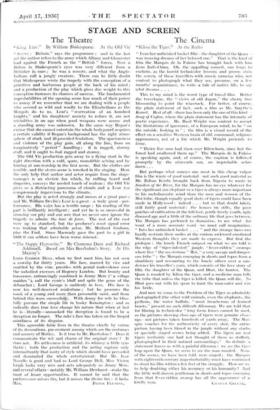"The Happy Hypocrite." By Clemence Dane and Richard Addinsell. Based
on Max Beerbohm's Story. At His Majesty's' LORD GEORGE HELL, when we first meet him, has not seen a cowslip for thirty years. His face, marred by vice and mottled by the vine, presides with genial malevolence over the unholiest excesses of Regency London. But beauty and innocence, entrancingly combined in Jenny Mere (" a village maiclen "h call the cynic's bluff and .spite the gems of the debaucher ; Lord George is .suddenly in love. His face is now his well-deserved misfortune.; but- he procures the mask. of a young and moreithan personable saint, and from behind thiS woos successf4y. With Jenny for wife he bliss- fully pursues the simple life in bosky Kensington ; and so radically doeS true love change his nature that when at last he is—literally—unmasked the deception is found to be a deception no longer. The rake's-face has taken on the limpid saintliness of its disguise.
This agreeable fable lives in the theatre chiefly by virtue of its decorations, pre-eminent among which are the costumes and scenery of Motley. Is it true to Mr. Beerbohm ? Does it communicate the wit and charm of the original story ? It does not. Its artlessness is artificial, its whimsy a little syn- thetic ; both the production and the acting capture only intermittently that unity of style which should have pervaded and dominated the whole entertainient. But Mr. Ivor Novell° is good and bad as Lord George Hell, Miss Vivien Leigh. looks very nice and acts adequately as Jenny Mere, and several others—notably- Mr. William. Dewhurst —make the most of lesser opportunities. It- cannot be said that the performance misses fire, but,it.misses the divine fire ; it lacks












































 Previous page
Previous page